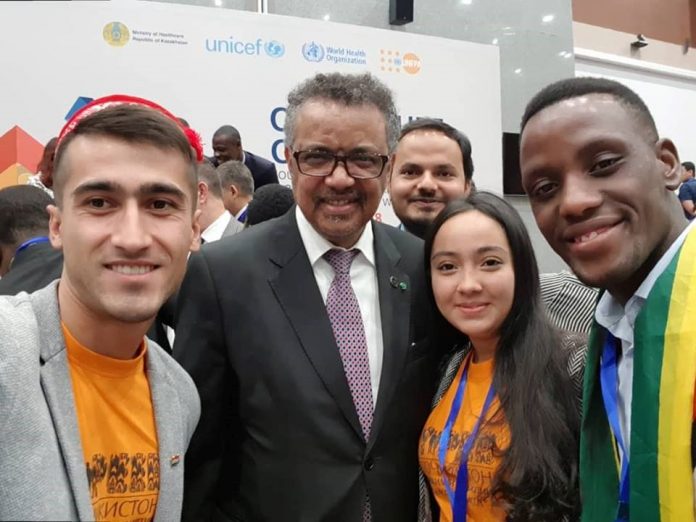
Report by Munashe Nyika, Young Nurse and Nursing Now Board Member
Astana, Kazakhstan 24th-26th October, 2018
The Global Conference on Primary Health Care, co-hosted by the Government of Kazakhstan, WHO and UNICEF, was held in Astana in October 2018 to commemorate the 40th anniversary of the Alma Ata Declaration on Primary Health Care.
The conference aimed to update and reaffirm the original principles of primary health care and served as an opportunity to renew the political commitment to put primary health care at the heart of achieving Universal Health Coverage and the Sustainable Development Goals. The conference was attended by over 2000 delegates and participants including government representatives, civil society, NGOs and youth leaders from over 150 countries. Ahead of the main conference, there was a Youth Preparatory Workshop.
The Youth Pre-conference took place at Nursultan Narzarbayev University, bringing together 120 participants to discuss primary health care. In attendance were also dignitaries such as Yelzhan Birtanov, Minister of Health of Kazakhstan, Dr Tedros Adhanom Gheybreyesus, WHO Director General, Ted Chaiban, Director Program Division at UNICEF. The session was interactive and started with each panelist giving a three minute message on primary health care. All the panelists made mention of how relevant the youth of today are in the journey towards Universal Health Coverage and the achievement of the SDGs.
After the departure of the dignitaries, the young folks present were divided into groups where they engaged in discussion and deliberated on the challenges and their experiences as users and providers of health care. Concerns raised by the youth on the accessibility and availability of primary health care included discrimination, marginalization, cultural and religious barriers and financial difficulties. Low salaries, inadequate medical supplies and work-overload were among the problems young health providers mentioned as challenges they faced.
The group also brainstormed on the way forward. Some of the points raised were developing health policies that are inclusive, improved use of technology in health care delivery such as drone delivery of medical products, more youth engagement programs that enhanced capacity of youth, increased political commitments of governments to the health sector and so on. The day was wrapped up by remarks from Deputy Executive Director of United National Population Fund, Mr. Dereje Wordofa, who congratulated the participants on making it to Astana and encouraged them to continue to be responsible persons, serving their societies and humanity at large.
The Conference
The main conference included a number of plenary and parallel sessions over two days. The conference kicked off with a welcome address by the Prime Minister of Kazakhstan, followed by the first plenary session for the day with the topic revitalizing primary health care in the 21st century to achieve Universal Health Coverage. Panelist Dr Githinji Gitahi, the C.E.O of AMREF, raised the concern that we have created a healthcare system, but not a health system. We have put so much focus on the human resources found at our hospitals and not the social and environmental factors that are determinants of health in our countries.
This was followed by heads of state and government plenary session where they talked about the whole of government approach to advance primary health care towards Universal Health Coverage. The Director General of the WHO, Dr Tedros, who also served as a panelist for the session pointed to the fact that we still have inequality in terms of accessing healthcare in our various countries. He also stressed on the importance of political choice in achieving an improved health system that can lead to Universal Health Coverage. The new Declaration on Primary Health Care was adopted at the end of the session and handed over to the youth participants, signaling how vital they are in achieving primary health care. The new declaration includes the following:
- Commitment to the fundamental right of every human to the enjoyment of the highest attainable standard of health without distinction of any kind.
- Strengthening PHC is the most inclusive, effective and efficient approach to enhance people’s physical, mental and social wellbeing. PHC is the foundation for the achievement of Universal Health Coverage.
- All levels of care delivery must be available to everyone, whether it is promotion, prevention, treatment, rehabilitative services or palliative care.
- Government and policy makers must be committed to make political choices for health across all sectors.
- Commitment to build sustainable PHC that will be in accordance with national legislation, contexts and priorities. The success of PHC will be driven by knowledge and capacity building, human resources for health, improved use of technology to ensure quality, safe, effective, and affordable health services.
- We must demonstrate high level commitment to empower individuals and communities through participation in the development and implementation of policies and plans that have an impact on health.
- There is the need to align stakeholder support to national policies, strategies and plans.
The final plenary session of the conference talked about Primary Health Care towards Universal Health Coverage and SDG 3. All ministerial representatives on the panel expressed their utmost commitment to making sure primary health care is for all in their respective countries by the year 2030. Young people were encouraged to play active roles to help advance the agenda and also meet the target of Universal Health Coverage within the stipulated timeline. The session was concluded with remarks from the Minister of Health for Kazakhstan, who expressed his profound gratitude to all the participants and delegates and also pleaded with all to contribute their best possible quota in achieving an equitable, effective and efficient primary health care globally.


